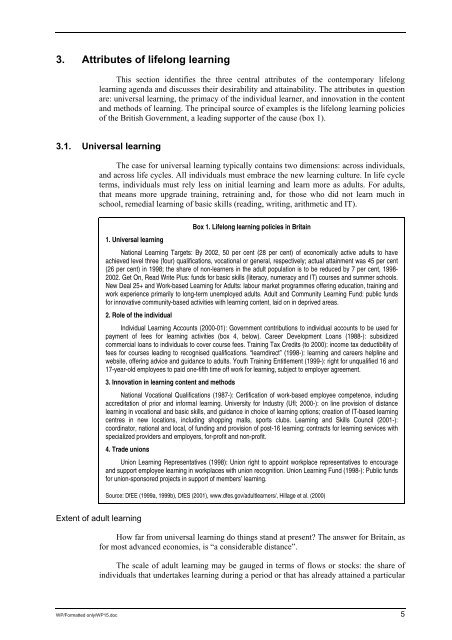Lifelong learning - International Labour Organization
Lifelong learning - International Labour Organization
Lifelong learning - International Labour Organization
You also want an ePaper? Increase the reach of your titles
YUMPU automatically turns print PDFs into web optimized ePapers that Google loves.
3. Attributes of lifelong <strong>learning</strong><br />
This section identifies the three central attributes of the contemporary lifelong<br />
<strong>learning</strong> agenda and discusses their desirability and attainability. The attributes in question<br />
are: universal <strong>learning</strong>, the primacy of the individual learner, and innovation in the content<br />
and methods of <strong>learning</strong>. The principal source of examples is the lifelong <strong>learning</strong> policies<br />
of the British Government, a leading supporter of the cause (box 1).<br />
3.1. Universal <strong>learning</strong><br />
The case for universal <strong>learning</strong> typically contains two dimensions: across individuals,<br />
and across life cycles. All individuals must embrace the new <strong>learning</strong> culture. In life cycle<br />
terms, individuals must rely less on initial <strong>learning</strong> and learn more as adults. For adults,<br />
that means more upgrade training, retraining and, for those who did not learn much in<br />
school, remedial <strong>learning</strong> of basic skills (reading, writing, arithmetic and IT).<br />
1. Universal <strong>learning</strong><br />
Box 1. <strong>Lifelong</strong> <strong>learning</strong> policies in Britain<br />
National Learning Targets: By 2002, 50 per cent (28 per cent) of economically active adults to have<br />
achieved level three (four) qualifications, vocational or general, respectively; actual attainment was 45 per cent<br />
(26 per cent) in 1998; the share of non-learners in the adult population is to be reduced by 7 per cent, 1998-<br />
2002. Get On, Read Write Plus: funds for basic skills (literacy, numeracy and IT) courses and summer schools.<br />
New Deal 25+ and Work-based Learning for Adults: labour market programmes offering education, training and<br />
work experience primarily to long-term unemployed adults. Adult and Community Learning Fund: public funds<br />
for innovative community-based activities with <strong>learning</strong> content, laid on in deprived areas.<br />
2. Role of the individual<br />
Individual Learning Accounts (2000-01): Government contributions to individual accounts to be used for<br />
payment of fees for <strong>learning</strong> activities (box 4, below). Career Development Loans (1988-): subsidized<br />
commercial loans to individuals to cover course fees. Training Tax Credits (to 2000): income tax deductibility of<br />
fees for courses leading to recognised qualifications. “learndirect” (1998-): <strong>learning</strong> and careers helpline and<br />
website, offering advice and guidance to adults. Youth Training Entitlement (1999-): right for unqualified 16 and<br />
17-year-old employees to paid one-fifth time off work for <strong>learning</strong>, subject to employer agreement.<br />
3. Innovation in <strong>learning</strong> content and methods<br />
National Vocational Qualifications (1987-): Certification of work-based employee competence, including<br />
accreditation of prior and informal <strong>learning</strong>. University for Industry (UfI; 2000-): on line provision of distance<br />
<strong>learning</strong> in vocational and basic skills, and guidance in choice of <strong>learning</strong> options; creation of IT-based <strong>learning</strong><br />
centres in new locations, including shopping malls, sports clubs. Learning and Skills Council (2001-):<br />
coordinator, national and local, of funding and provision of post-16 <strong>learning</strong>; contracts for <strong>learning</strong> services with<br />
specialized providers and employers, for-profit and non-profit.<br />
4. Trade unions<br />
Extent of adult <strong>learning</strong><br />
Union Learning Representatives (1998): Union right to appoint workplace representatives to encourage<br />
and support employee <strong>learning</strong> in workplaces with union recognition. Union Learning Fund (1998-): Public funds<br />
for union-sponsored projects in support of members’ <strong>learning</strong>.<br />
Source: DfEE (1999a, 1999b), DfES (2001), www.dfes.gov/adultlearners/, Hillage et al. (2000)<br />
How far from universal <strong>learning</strong> do things stand at present? The answer for Britain, as<br />
for most advanced economies, is “a considerable distance”.<br />
The scale of adult <strong>learning</strong> may be gauged in terms of flows or stocks: the share of<br />
individuals that undertakes <strong>learning</strong> during a period or that has already attained a particular<br />
WP/Formatted only/WP15.doc 5

















